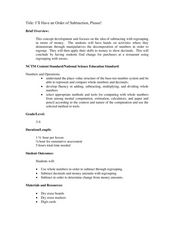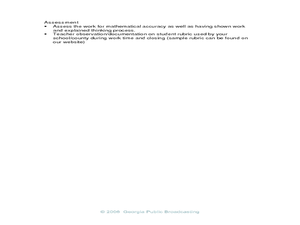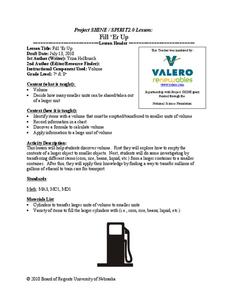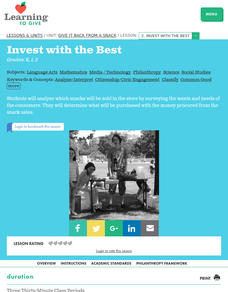Curated OER
How Much Does it Cost to Light Your School?
Learners compute the cost of electricity used to light their classroom and their school for various lengths of time. They compute the amount of coal needed to produce the electricity used for one hour of light in their classroom. An...
Visa
Money Responsibility
Introduce young learners to the important life skill of responsibly managing money and recording how much they spend and save.
King County
Reproductive System
It's every health and science teacher's favorite subject to cover: the reproductive system. This comprehensive lesson introduces adolescents to the reproductive anatomy of men and women with the help of a series of diagrams,...
Federal Reserve Bank
Expense Tracking
Where does all your money go? Individuals keep a record of the money they spend over the course of 30 days. They then categorize where they are spending their money and write an essay detailing their findings.
Federal Reserve Bank
Financial Goals
Do you have financial goals? How will you make them happen? Help your pupils answer these questions through this interactive project. They create goals and a plan for reaching them as one of many high school algebra projects.
Agriculture in the Classroom
A Rafter of Turkeys
How did that turkey get from the early Aztec culture to your table? Learn about the history of wild and domesticated turkeys in North America, as well as their inclusion in Thanksgiving traditions, with a two-part agricultural science...
Curated OER
Citrus Fruit Counting and Problem Solving
In these two counting citrus fruits worksheets, students add and subtract by coloring the fruits and solving the problems and problem solving consumer math word problems. Students solve 12 problems.
Curated OER
The Teenage Consumer
Students think critically regarding teenage spending. In this data collection lesson, students discuss teenage consumers and their spending habits. Students note their own spending habits for comparison purposes.
Curated OER
I'll Have an Order of Subtraction Please!
Students explore number values by completing consumer math worksheets. In this math functions lesson, students identify the use of a decimal in numbers and the place values that are represented when dealing with money. Students complete...
Curated OER
Store Wide Sale
Students practice figuring percentages by solving written shopping problems. In this consumer math lesson, students read several scenarios dealing with items on sale and must figure out the new price. Students check their...
Curated OER
Adding and Subtracting Bears and Goats
First graders evaluate math problems using farm animals. In this consumer math lesson, 1st graders discover math problems which concern quantities of farm animals. Students discover new strategies to help them analyze their...
Curated OER
Marta Pricing Options
Third graders determine whether buying a "package deal" is really the best deal. In this consumer math lesson plan, 3rd graders watch a video clip and use math skills to solve a word problem determining which "package deal" is the best...
Curated OER
Count On It!
Learners practice counting money. In this consumer math lesson, students identify the various U.S. coins and group them in various ways to equal a dollar. Learners will use the money they collected for a donation towards a non-profit...
Curated OER
Equivalents Bingo-Enrichment Activity
Sometimes you need to play a game in order to reinforce learning. Use Bingo cards to review the equivalents for both dry and liquid portions. Playing Bingo helps learners to practice recognizing measurement units, abbreviations, and...
Curated OER
Fill 'Er Up
Students identify how many smaller units can be found in a later unit. For this geometry lesson, students calculate the volume and the transfer amount to a smaller unit. They solve real life problems using the formula for volume.
Consumers Energy
The Cost of Electricity
How much is your toaster costing you every day? Young environmentalists calculate the monetary costs of household appliances based on their average consumption of wattage.
Curated OER
Prairie Food Chains & Webs
Students complete a food chain. In this ecosystem lesson, students learn about producers, consumers and decomposers. Students identify herbivores, carnivores and omnivores and complete two worksheets.
Curated OER
Intermediate Activity: Energy Guide Labels
High schoolers explore energy efficient appliances. In this economics and ecology instructional activity, students compare and analyze EnergyGuide labels of various appliances. High schoolers discuss federal government...
Curated OER
Simulation and Accounting Practices
Learners implement their knowledge about accounting practices into a simulation activity. In this secondary consumer/business math lesson, students participate in a simulation centered on the life of the people during the...
Curated OER
Open & Operating: The Federal Reserve Responds to September 11
Students investigate the purpose of a central bank. In this economics/consumer mathematics lesson, students explore the actions of the Federal Reserve after the events of September 11, 2001. Students investigate the role of...
EngageNY
Markup and Markdown Problems
There is a 100 percent chance this resource will help pupils connect percents to financial literacy. Young mathematicians use their knowledge of percents to find markups and markdowns in financial situations in the seventh segment in a...
PricewaterhouseCoopers
Consumer Fraud
Falling into the hands of a credit scam is much too common these days, and the young adults in the classroom need to be prepared. Through the activity, learners discover how to be a safe spender and use common sense when...
Curated OER
Give It Back From a Snack Lesson 2: Invest With the Best
Students survey schoolmate as to what type of snacks they would prefer to purchase. They graph the results and apply them to planning a classroom snack sale while examining what wants, needs, and consumers are.
Curated OER
Potato Ways
Students analyze the packaging process. In this consumer awareness lesson, students analyze the process of packaging a potato and identify positive and negative ways of packaging. Students study statistics on an overhead transparency to...























